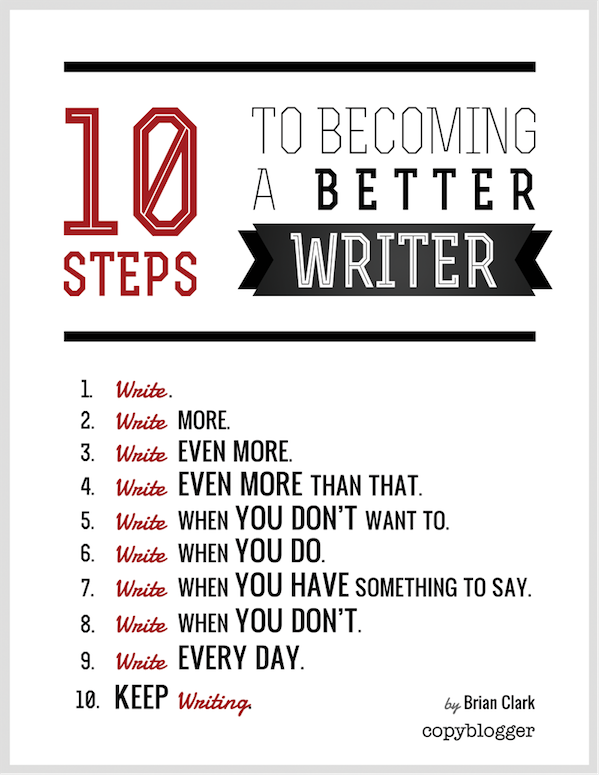Imagine yourself as a budding writer with a passion for storytelling. You dream of captivating readers with your beautiful prose and thought-provoking ideas, but you’re not quite sure how to take your writing to the next level. Fear not, for we have six invaluable tips to help you become a better writer. Whether you aspire to write novels, articles, or even just impress your professors with stellar essays, these tips will provide you with the foundation you need to improve your writing skills and unleash your creativity. So, grab your pen and paper, or perhaps open a blank document, and let’s dive into the world of writing!

This image is property of dailyinfographic.com.
Tip 1: Read extensively
Reading extensively is an essential step in becoming a better writer. When you read a variety of genres, you expose yourself to different writing styles and storytelling techniques. Whether it’s fiction, non-fiction, poetry, or even articles, each genre has its own unique flair that can inspire and influence your own writing. By immersing yourself in various literary works, you can expand your knowledge and understanding of what good writing entails.
While reading, it’s important to study different writing styles. Pay attention to authors who have a strong command of language and effectively convey their ideas. Analyzing the works of well-established writers can help you identify techniques and strategies that make their writing stand out. Consider the ways they structure their sentences, develop characters, and create imagery. Take notes on the techniques you find particularly effective, so you can use them as inspiration in your own writing.
Tip 2: Write every day
Writing every day is a practice that can greatly enhance your writing skills. Set aside dedicated time for writing, even if it’s just 15 minutes a day. By establishing a consistent routine, you develop the habit of sitting down and putting your thoughts into words. Starting with free writing can be a great way to get your creative juices flowing. It involves writing without any specific topic or goal in mind, allowing your thoughts to flow freely. This exercise helps train your brain to generate ideas and overcome writer’s block.
In addition to free writing, it’s beneficial to practice different writing exercises. These exercises can focus on specific aspects of writing, such as character development, descriptive writing, or dialogue. By challenging yourself to explore different writing techniques, you broaden your skill set and discover new ways to engage your readers. Look for writing prompts online or create your own to keep the writing practice interesting and diverse.

This image is property of copyblogger.com.
Tip 3: Expand your vocabulary
Expanding your vocabulary is crucial in becoming a better writer. A wide range of words allows you to express yourself more precisely and vividly. To enhance your vocabulary, make it a habit to read a dictionary or thesaurus regularly. Look up words that are unfamiliar to you and learn their meanings and synonyms. The more words you know, the more options you have when crafting your sentences.
As you learn new words, challenge yourself to use them in your writing. Experiment with incorporating these words into your sentences to add depth and complexity. Be careful not to overuse complex or uncommon words, as it could make your writing appear forced or hard to understand. Strive for a balance between simplicity and eloquence to keep your writing accessible and engaging.
Tip 4: Seek feedback
Seeking feedback is an invaluable step towards improving as a writer. Joining a writing group or workshop provides a supportive community where you can share your work and receive constructive criticism. These groups often provide a platform for writers to exchange ideas, give feedback, and learn from one another. It’s essential to seek out a group that aligns with your writing goals and style.
In addition to writing groups, consider sharing your work with trusted friends or mentors. They can offer a fresh perspective and provide feedback from a different point of view. Constructive criticism helps identify areas for improvement and can provide helpful suggestions for enhancing your writing. Additionally, professional editing services can be beneficial for those who want more in-depth feedback and editing expertise.

This image is property of miro.medium.com.
Tip 5: Edit and revise
Editing and revising is a critical step in the writing process. After completing a draft, it’s essential to take a break before revising. Stepping away from your work for a while allows you to approach it with a fresh perspective. When you come back to it, you’ll be able to spot areas that need improvement more easily.
During the editing process, focus on checking for grammar and spelling errors. A well-edited piece of writing demonstrates your attention to detail and professionalism. Additionally, make sure your ideas flow logically. Pay attention to the organization and coherence of your writing. Are your thoughts well-structured and connected? Are transitions smooth and seamless? These aspects contribute to a polished and well-crafted piece of writing.
Tip 6: Experiment with different writing techniques
To keep your writing fresh and engaging, it’s important to experiment with different writing techniques. Try different narrative perspectives to see how it affects the tone and impact of your storytelling. Writing in first person, third person, or even second person can create different reader experiences and determine the level of intimacy between the narrator and the audience.
Playing with metaphor and imagery is another technique to consider. Metaphors allow you to make connections and create vivid descriptions that resonate with readers. Imagery, on the other hand, appeals to our senses and helps readers visualize your words. Experimenting with different sentence structures can also add variety to your writing. Varying the length and structure of your sentences keeps your writing dynamic and helps maintain your reader’s interest.

This image is property of www.languagewire.com.
Tip 7: Practice active reading
Active reading is a powerful tool for becoming a better writer. As you read, make a habit of annotating and taking notes. Underline sentences that resonate with you or highlight passages that showcase effective writing techniques. By actively engaging with the text, you’ll develop a deeper understanding of the author’s choices and learn from their writing strategies.
Analyze the author’s techniques and consider how they contribute to the overall tone and impact of the piece. Pay attention to the use of literary devices, character development, and the way dialogue is presented. As you identify effective writing techniques, try to emulate them in your own work. Active reading helps you internalize good writing practices and develop a discerning eye for quality writing.
Tip 8: Embrace constructive criticism
Embracing constructive criticism is essential for growth as a writer. It’s important to separate your work from your identity. Remember that feedback is not a personal attack, but rather an opportunity for improvement. Approach feedback objectively and listen to the suggestions and advice offered. Be willing to consider different perspectives and make changes accordingly.
Constructive criticism provides valuable insights into areas that may need improvement. Use this feedback as a tool to refine your writing skills and enhance the quality of your work. Embracing criticism helps you develop resilience as a writer and fuels your motivation to continuously improve.

This image is property of postcron.com.
Tip 9: Set writing goals
Setting writing goals is a powerful way to motivate yourself and track your progress. Establish both short-term and long-term writing goals to give yourself direction and purpose. Short-term goals can focus on completing specific writing projects or improving in a particular aspect of writing. Long-term goals can involve publishing a book, winning a writing competition, or securing a writing job.
Create deadlines for yourself that align with your goals. Set realistic timelines that push you to work consistently without overwhelming yourself. By holding yourself accountable to these deadlines, you’ll establish a disciplined writing practice and make significant progress towards achieving your goals. Tracking your progress can also provide a sense of accomplishment and motivate you to keep striving for improvement.
Tip 10: Find a writing routine
Establishing a consistent writing routine is key to maintaining a productive writing practice. Create a dedicated writing space where you can focus and minimize distractions. This space can be a specific room, a cozy corner, or even a local café. The important thing is to have a designated space that allows you to immerse yourself in the writing process.
Additionally, establish a specific writing time that works best for you. Some writers prefer early mornings, while others are more productive during late nights. Find the time of day when you feel most energized and creative, and make it a habit to write during this period. Eliminate distractions during this time, such as turning off social media notifications or putting your phone on silent. By creating a consistent writing routine, you’ll develop discipline and maximize your writing productivity.